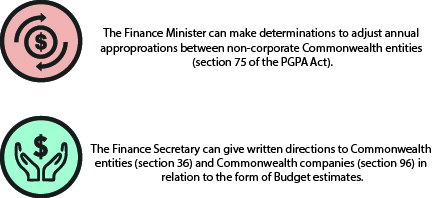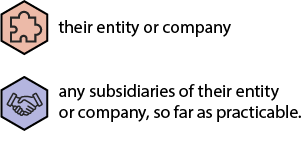Public Governance, Performance and Accountability Act 2013
The Public Governance, Performance and Accountability Act 2013 (PGPA Act) establishes a coherent system of governance and accountability for public resources, with an emphasis on planning, performance and reporting.
The PGPA Act applies to:

The Flipchart of PGPA Act entities and companies provides a comprehensive list of the government bodies subject to the PGPA Act.
Public Governance, Performance and Accountability Rule 2014
The Public
Governance, Performance and Accountability Rule 2014 (PGPA
Rule) and other legislative instruments establish the
requirements and procedures necessary to give effect to the
governance, performance and accountability matters covered
by the PGPA Act.
PGPA associated instruments and policies
The following table provides the instruments and policies of the Australian Government that are currently in effect under, or support, the PGPA Act. The table also outlines who they apply to.
|
Instruments and Policies |
NCEs |
CCEs |
CCs |
|
✔ |
✔ |
✔ |
|
|
✔ |
✔ |
✔ |
|
|
✔ |
CCEs prescribed in section 30 PGPA Rule |
|
|
|
✔ |
|
|
|
|
✔ |
✔ |
|
|
|
|
9 prescribed CCEs entitled to maintain investments under s59 of the PGPA Act |
|
|
|
Finance Ministerís Delegations: PGPA (Finance Minister to Finance Secretary) Delegation 2022 |
✔ |
|
|
|
Finance Minister determinations to establish, vary or revoke a special account (section 78 of the PGPA Act). |
✔ |
|
|
|
|
|
prescribes relevant companies under s 85 PGPA Act |
|
|
Rules establishing Commonwealth Corporate Entities: PGPA (Establishing the Australian Digital Health Agency) Rule 2016 |
|
✔ |
|
|
Policies of the Australian Government include: Commonwealth Risk Management Policy Commonwealth Governance Structures Policy Australian Government Charging Framework Procurement connected policies Supplier Pay on-Time or Pay Interest Policy Whole-of-government ICT policy Whole-of-government arrangements for the purchase of certain goods and services |
✔ |
Procurement related policies apply to CCEs prescribed in section 30 PGPA Rule |
|
|
Government policy orders (to apply policies of the Australian Government to corporate Commonwealth entities) |
|
✔ |
✔ |

Duties of accountable authorities to comply with Government Policy
An accountable authority of a non-corporate Commonwealth entity must govern their entity in a way that is not inconsistent with relevant policies of the Australian Government. Finance has developed guidance to support accountable authorities, in consultation with the Australian Government Solicitor.
This guidance is also available in the right hand menu under Tools and templates.
Government Policy Orders
An accountable authority of a corporate Commonwealth entity must comply with policies specified in a government policy order made by the Finance Minister.
For a corporate Commonwealth entity or Commonwealth company that is subject to a Government Policy Order:
- the accountable authority of the corporate Commonwealth entity (section 22(3) PGPA Act) or the directors of the company (section 93(3) PGPA Act) must ensure the Government Policy Order is complied with by:

- the corporate Commonwealth entity (section 17BE(e) PGPA Rule) or company (section 28E(d) PGPA Rule) must include details of the Government Policy Order in their annual report
- non-compliance with the Government Policy Order may constitute significant non‑compliance with finance law and will need to be disclosed to the responsible Minister by the corporate Commonwealth entity (section 19 PGPA Act) or the company (section 91 PGPA Act) as soon as practicable.
Current Government Policy Orders
| GPO date | GPO | Applies to |
|---|---|---|
|
24 August 2017 |
Public Governance, Performance and Accountability (Charging for Regulatory Activities) Order 2017
|
Australian Grape and Wine Authority |
|
25 November 2016 |
Australian Pesticides and Veterinary Medicines Authority |
Finance Minister's delegation of powers and functions in PGPA legislation
The Finance Minister has delegated some powers and functions in the PGPA Act to accountable authorities of non-corporate Commonwealth entities (in accordance with section107(1)).
Delegates must comply with the directions in the delegation instruments.
Current delegations
The current delegations instruments were signed on 17 July 2022 and took effect 1 September 2022:
- The PGPA (Finance Minister to Accountable Authorities of Non-Corporate Commonwealth Entities) Delegation 2022
- The PGPA (Finance Minister to Finance Secretary) Delegation 2022.
The previous delegations are the instruments signed on 15 January 2021 and commenced 1 February 2021:
- The PGPA (Finance Minister to Accountable Authorities of Non-Corporate Commonwealth Entities) Delegation 2021
- The PGPA (Finance Minister to Finance Secretary) Delegation 2021.
The delegation instruments are available in the table above and in the right hand menu under Policies, legislation and guidelines.
Powers and functions that can be delegated
Accountable authorities of non‑corporate Commonwealth entities can delegate the powers listed below, functions or duties in the PGPA Act to officials (in accordance with section 110(1)(a)).
|
PGPA Act |
|
|---|---|
|
Section 23 |
|
|
Section 24 |
|
|
Section 36 |
|
|
Section 45 |
|
|
Section 46 |
|
|
PGPA Rule |
|
|
Section 10 |
|
|
Section 11 |
|
Accountable authorities of non‑corporate Commonwealth entities can subdelegate the powers listed below in the PGPA Act to officials that are delegated to them by the Finance Minister (in accordance with section 110(1)(b), (5) and (6)).
|
PGPA Act |
|
|---|---|
|
Section 53 |
|
|
Section 56 |
|
|
Section 60 |
|
|
Section 63 |
|
|
Section 66 |
|
|
Section 77 |
|
|
PGPA Rule |
|
|
Section 25 |
|
Accountable authorities of certain specified non‑corporate Commonwealth entities can also subdelegate the powers listed below.
|
PGPA Act |
|
|---|---|
|
Section 53 |
|
|
Section 58 |
|
|
Section 63 |
|
Powers, functions and duties that cannot be delegated
The powers, functions or duties in the PGPA Act, listed below, cannot be delegated by the accountable authority (section 110(2)).
|
PGPA Act |
|
|---|---|
|
Section 15 |
|
|
Section 16 |
|
|
Section 17 |
|
|
Section 18 |
|
|
Section 19 |
|
|
Section 20A |
|
|
Section 35 |
|
|
Section 37 |
|
|
Section 38 |
|
|
Section 39 |
|
|
Section 41 |
|
|
Section 42 |
|
|
Section 43 |
|
|
PGPA Rule |
|
|
Section 29 |
|
Finance Secretary Direction
Commonwealth entities that produce the Portfolio Budget Statement must meet the requirements under the Finance Secretary Direction. The current Finance Secretary Direction on the Requirements for Performance Information in Portfolio Budget Statements was issued on 21 August 2022.
For further information, see Reporting performance information in Portfolio Budget Statements (RMG 129) in the right hand menu under Tools and templates.
Resource Management Guides
A suite of Resource Management Guides (RMGs) are available to support you in meeting the requirements of the PGPA Act and Rule.
An index of RMGs available on the Finance website is included in the right hand menu under Tools and templates.
RMGs are developed with a digital-first focus and updated in real time and should be your first point of reference. Printed or saved versions are only current at the time of printing, so be sure to use the digital version in the first instance. RMG updates are notified through the PGPA Newsletter, issued via email and available under Latest News.
Any comments or questions on the RMGs should be sent to PGPA@finance.gov.au.